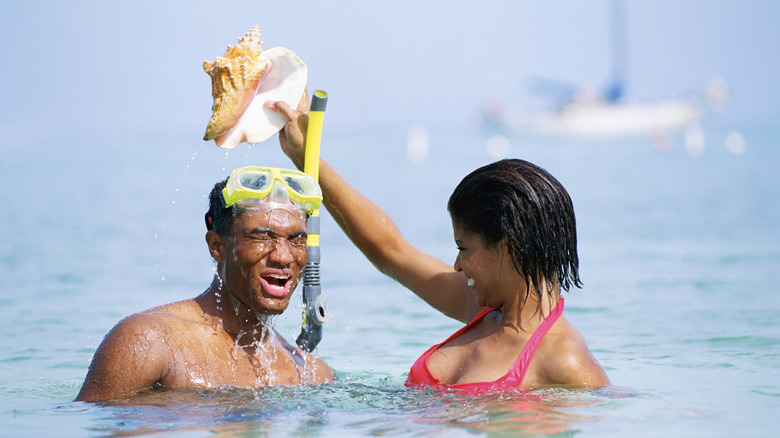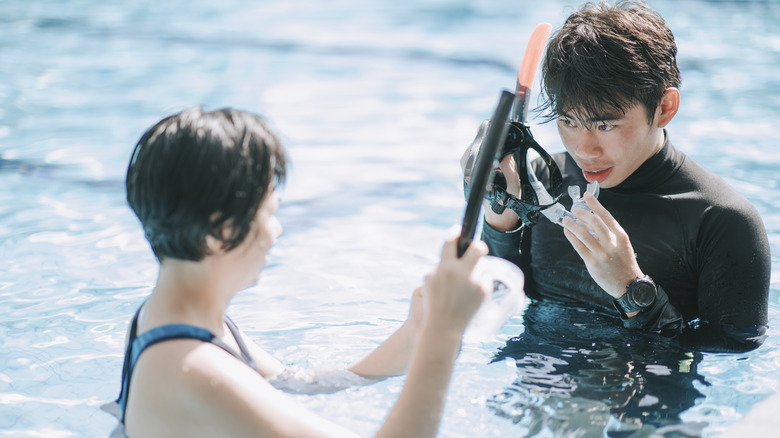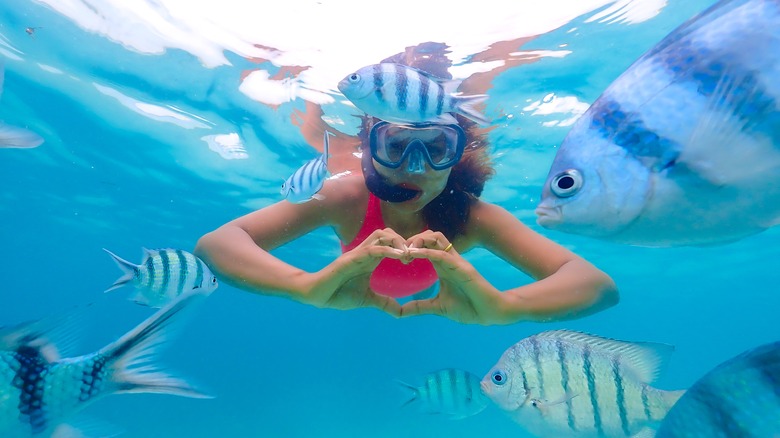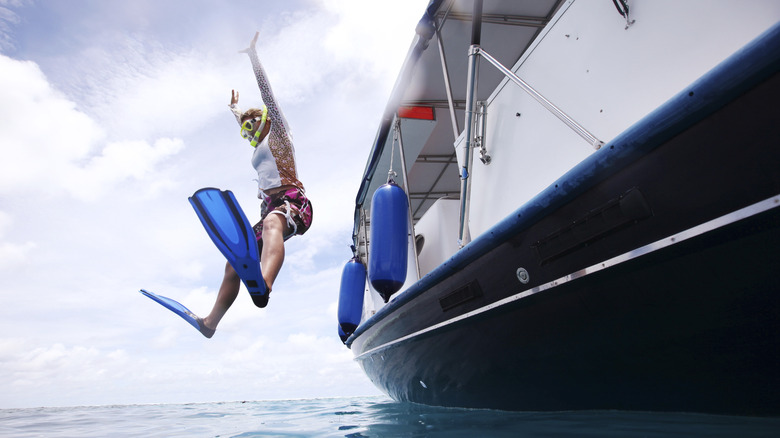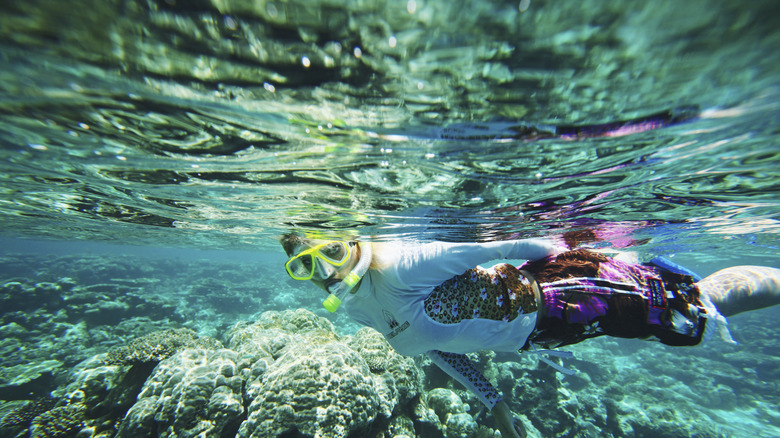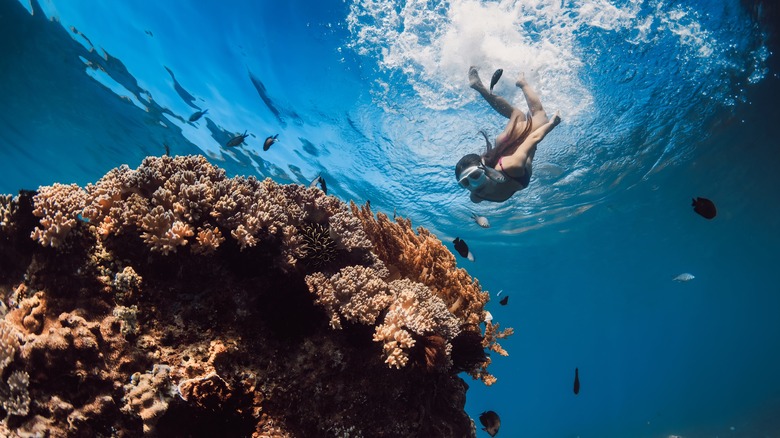5 Mistakes To Avoid When Snorkeling For The First Time
Snorkeling can be both incredibly calming as well as exhilarating. As you're submerged in the water, you feel like you're in a completely different world. Things seem to move slower, and it's easy to get mesmerized watching the marine animals go about their lives. There are resorts where you can snorkel with sea turtles, places where you can see rays, and even underwater sculpture gardens to explore.
It's something that you can do without too much prep — unlike scuba diving, where you have to do a fair amount of studying and work before you can go out without an instructor — but there are still some things you need to know before you go snorkeling for the first time. If you have a bad experience during your inaugural snorkel outing, you may be less likely to go again. Set yourself up for success by knowing five things not to do — like not practicing with your gear, going out alone, and not respecting the underwater environment.
Mistake 1: Not practicing with your gear
Whether you've purchased or rented your equipment, take some time to familiarize yourself with it and see how it all works. Snorkeling isn't very complicated — put on the mask and breathe through the tube — so there's a quick learning curve. But don't let that simplicity trick you into thinking you can just dive straight in. Put on your mask and make sure it fits tight, but not too tight, to your face so there are not any leaks.
Then take the time to practice wearing the mask while breathing through your mouth with the tube in shallow water, a pool, or even a bathtub. It's a different sensation, breathing through the tube, and it may take a bit to get used to. Once that feels comfortable, move through the water with the aid of your fins. Do they feel comfortable on your feet? You don't want them slipping off or cutting off circulation.
Finally, don't leave your practice session without testing some of the more potentially stressful situations that can happen. Try things like getting water out of your snorkel mask and purging water out of your tube. You might feel a little silly at first, but if you skip this step, you could end up spending your entire time snorkeling feeling anxious and worried about what might happen. Give yourself confidence by understanding your gear before you get out into deeper, open water.
Mistake 2: Breathing too fast and rushing through the water
If you're snorkeling for the first time, you might be a little bit anxious, which could unhelpfully speed up your breathing. If you start breathing shallowly and quickly, the air in the tube may not get fully exchanged, which could mean you're getting more carbon dioxide with each breath. This will lead you to get tired more quickly. Instead, concentrate on breathing deeply and calmly.
To help with that, you should pace yourself. The goal isn't to go as far and as fast as possible; instead, it's to immerse yourself in the natural world. It's really more about floating than it is swimming. Use your legs and fins to leisurely move through the water. Keep your hands and arms at your sides, holding a flotation device if you're using one, or crossed across your chest to reduce drag and to help keep you from touching anything accidentally as you snorkel. You'll notice that, as you focus on taking slow, easy, full breaths and moving slowly through the water, snorkeling can almost feel like a meditative practice.
Mistake 3: Going from a boat
A number of awesome snorkeling trips start by jumping off a boat, but that often means being in over your head, literally. Combining deeper water where you may have to concentrate on staying afloat with those aforementioned nerves, which can make it harder to breathe slowly and deeply, can be a recipe for a stressful snorkeling experience. Instead, choose a calm, protected beach for your first time, so you can go into deeper water at your own pace and gradually become more comfortable and confident. You can also access shallower water to stand up, take a break, and clear your mask or tube without as much practice. Note, never stand up if you're snorkeling over coral.
Even if you're going in from a beach and you're not a strong swimmer or want to conserve your energy, consider snorkeling with a flotation device. It could be as simple as a pool noodle or a specially designed snorkel vest. Standard personal flotation devices (PFDs) are designed to keep your head up and out of the water, so they don't work as well when snorkeling. After all, you want your face to look down into the water. However, if you hold it against your chest instead of wearing it, you should be able to position your body horizontally at the surface.
Mistake 4: Going by yourself and not paying attention to where you are
You might be traveling solo — more power to you! — or you might be traveling with people who don't want to snorkel when you do. But you still shouldn't go alone for your first time. At the absolute very least, you should be in a place where there are lifeguards present, and tell someone where you're going to be and for how long. A much better and safer option, if you can't get anyone in your group to go with you, book yourself a lesson or a snorkel tour that leaves from a calm beach. Water can be unpredictable, particularly the ocean with waves, surges, and rip currents, and you want to have someone with you who is looking out for you.
Even with a group, you should pay attention to where you are in the water. Take a moment every once in a while to lift your head up and orient yourself to where you are. Have you drifted farther out than you thought? Do some research before you go in — is this an area with a lot of currents? What's the tide schedule? How deep does it get? What kind of marine life is there? The more you know about what to expect, the more comfortable and confident you'll be in the water.
Mistake 5: Not caring for the environment around you
Snorkeling takes you into a different environment, and it's one that you need to treat with respect, starting with keeping your hands to yourself. It can be tempting to reach out and touch things, but remember, you're in the wild. Don't feed, touch, or pick up any marine life. If for no other reason than the fact that touching some things underwater can cause injury, and you really don't want to get it wrong! Also, a lot of great snorkeling is near coral reefs, and while coral may not look like it's alive, it is. Touching it or standing on it can cause major damage.
Reefs also need your help when it comes to your choice of sun protection. Plenty of sunscreens contain chemicals that cause problems in a number of marine species, including corals. Look for reef-safe, mineral sunscreens, like Raw Elements, which are made with non-nano zinc oxide or titanium oxide. These ingredients cause a lot less damage to the marine environment while keeping you protected from the sun. Now that you know what not to do your first time snorkeling, check out these stunning snorkeling destinations in the U.S. for some inspiration to dive in.
